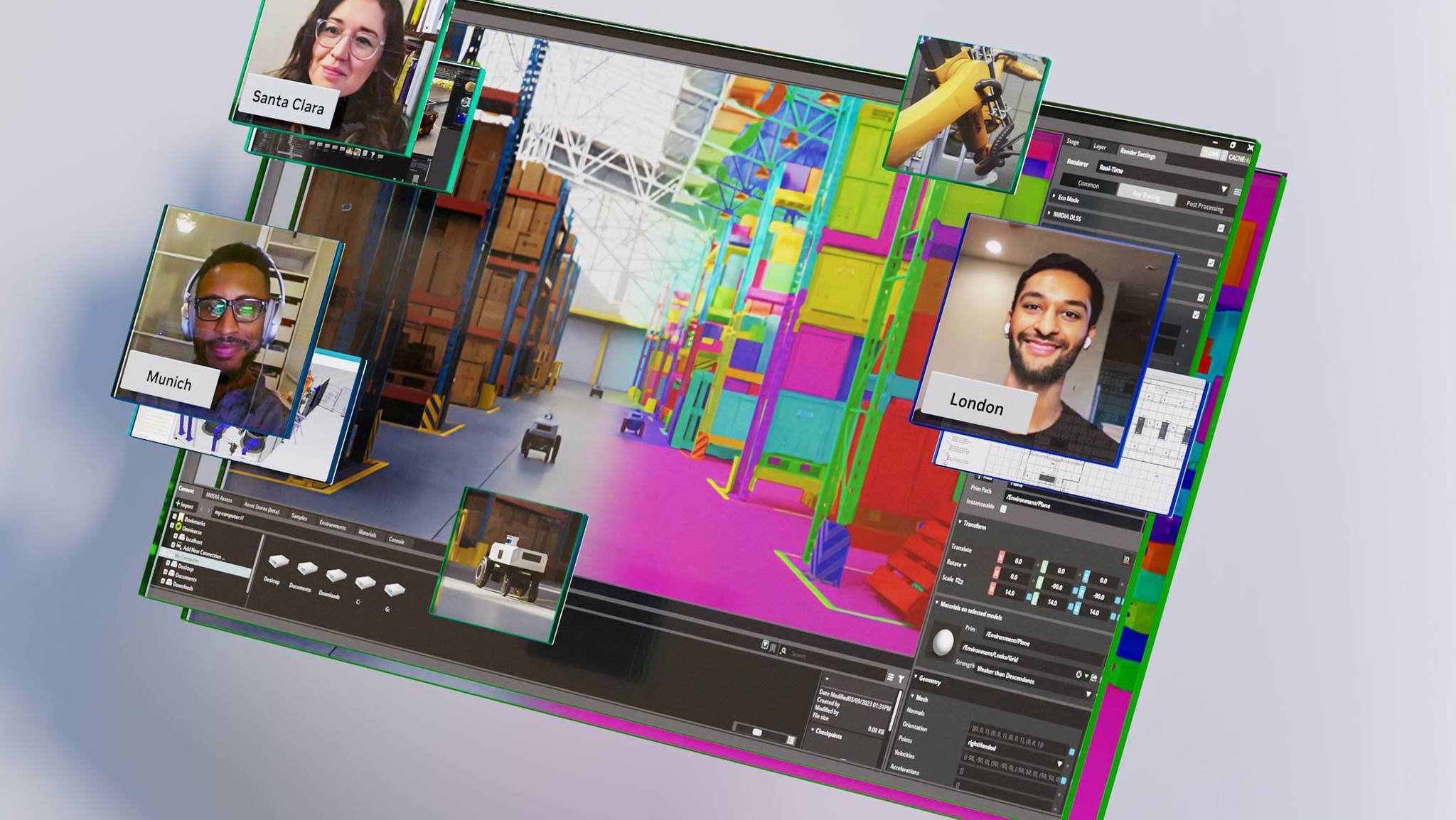 EMERGING TECH
EMERGING TECH
 EMERGING TECH
EMERGING TECH
 EMERGING TECH
EMERGING TECH
Graphics chip and artificial intelligence infrastructure provider Nvidia Corp. today used the Computex 2023 held in Taipei, Taiwan, to announce a reference workflow that uses its suite of technologies to advance the digitalization of the industrial manufacturing sector.
The goal is to streamline significantly the planning, construction, operation and optimization of factories. Among other things, it’s part of a move by manufacturers and others to what’s known as the industrial metaverse, which uses virtual and augmented reality to blend the physical and digital worlds to transform how businesses design, manufacture and interact with objects.
The workflow integrates various Nvidia tools, including Omniverse for 3D collaboration and generative artificial intelligence, Isaac Sim for robotic simulations, and Metropolis AI for automated optical inspections. Prominent electronics manufacturers, including Foxconn Industrial Internet, Innodisk, Pegatron, Quanta and Wistron, are already implementing this reference workflow. For instance, Foxconn is leveraging Metropolis to automate large sections of its circuit-board quality-assurance inspection points.
During a prebriefing with press and analysts, Deepu Talla, vice president and general manager of embedded and edge computing at Nvidia, shared more details about the company’s efforts around industrial digitalization, which is essentially the process of leveraging digital technologies to transform operations. Talla highlighted the following three key developments.
Omniverse is Nvidia’s platform designed for industrial metaverse applications. Its use cases include creating AI models, synthetic data generation, robotic simulation, building digital twins of industries such as a warehouse or a factory, and 3D design. It’s accessible from a workstation with an Nvidia GPU, on an on-premises server or Azure Cloud.
Omniverse depends heavily on design and engineering tools from companies like Autodesk and Siemens. A number of leading electronics manufacturers in Taiwan have adopted Nvidia AI and Omniverse for digitalizing their factories.
“The promise of simulation has always been clear — it’s faster, cheaper and safer,” said Talla. “With Omniverse and Nvidia AI, the combination of the two, factories can start with simulation to test before the physical thing is built. Even after it’s built, it can constantly be updated and modified in simulation before it’s introduced into the real world. So, the case for industrial digitalization is very clear.”
Metropolis is Nvidia’s platform for intelligent video analytics and is deployed in urban spaces, traffic intersections, retail stores and healthcare. It’s introducing Metropolis for factories, primarily for automated inspection. The workflow involves Omniverse for synthetic data generation, TAO Toolkit for model training, and a runtime system on-premise or in the cloud.
The toolkit, built on TensorFlow and PyTorch, makes the process of creating AI models straightforward. Even if limited data is available, TAO uses a technique called transfer learning, which reuses parts of premade models that can be adapted to specific business needs.
“Inspection happens primarily in two phases, which involves many false positives,” Talla said. “Humans are doing secondary inspection today. But our customers and partners have come to us and asked us to build a solution where Metropolis can be deployed for secondary inspection, and AI can be used to improve throughput. We’ve taken the same Metropolis workflow for different applications, and we created one for factories.”
Talla noted that the success of Metropolis for factories depends on a range of partners, from application providers, equipment makers, and synthetic data providers to system integrators. Nvidia is working with a variety of partners, including Adlink, Aetina, Deloitte, Quantiphi and Siemens, to bring customers tailor-made solutions for automating factories.
Isaac is Nvidia’s robotics platform used to train models, simulate robots and manage a fleet of robots. It has been building this platform and its partner ecosystem for years, with more than 1,000 companies currently using it in production or development.
Nvidia is rolling out a complete end-to-end software stack for autonomous mobile robots called Isaac AMR, which will be available to early customers in July. It consists of three main parts: simulation (a virtual representation of what a robot will build), mapping (software that creates maps to help a robot understand its surroundings) and autonomy (uses the full Nvidia platform to enable the robot to operate independently).
These developments showcase Nvidia continuous efforts in pushing the boundaries of AI and, now, simulation in industrial applications to promote the broad-scale digitalization of factories. If widely adopted, the technologies could transform the manufacturing sector.
The announcements at Computex are important for Nvidia in that they tie together multiple products and create more of a suite sale for the company. Nvidia just came off a massive quarter in which it became the first chipmaker to cross the trillion-dollar market cap mark. The cross-product suite sales model should bring larger, higher-margin deals, allowing it to continue its strong momentum.
Zeus Kerravala is a principal analyst at ZK Research, a division of Kerravala Consulting. He wrote this article for SiliconANGLE.
THANK YOU